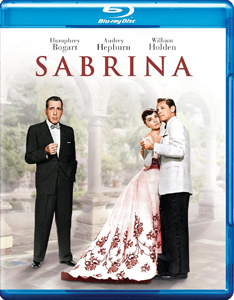At one point in “Sabrina” (1954), Linus Larrabee (Humphrey Bogart) asks Sabrina Fairchild (Audrey Hepburn) to sing her song in French for him again, slower. It’s an encapsulation of the whole film; we want to stay in its lightly funny and slyly romantic ambiance, and if it goes a little slower we won’t complain.
As it stands, the pacing and plotting rhythms – so often the case in Billy Wilder movies – are perfect, elevating “Sabrina” to iconic status in the love-triangle genre.
Twenty-something Sabrina is the daughter of chauffer Thomas (John Williams) at the Larrabee family’s grand Long Island estate. Father and daughter live above the eight-car garage where the girl, love-struck throughout her young life by Linus’ cad of a younger bro David (William Holden), tries to kill herself via carbon monoxide upon David’s engagement to another woman.

“Sabrina” (1954)
Director: Billy Wilder
Writers: Billy Wilder, Samuel A. Taylor, Ernest Lehman
Stars: Humphrey Bogart, Audrey Hepburn, William Holden
The fact that even this sequence isn’t particularly heavy sets the tone. Wilder, Samuel A. Taylor and Ernest Lehman – working from Taylor’s hit play “Sabrina Fair” – pen an efficient yet rich script wherein every bit of humor advances the plot or our knowledge of a character.
Delightful, character-driven humor
Although the exploration of strategic corporate growth could be too complex, it isn’t, and the screenwriters trust the audience. “What rhymes with glass?” David asks Linus when writing a poem to Sabrina, and we’re allowed to complete the punchline ourselves, so fresh in our minds is David’s injury from sitting on wineglasses.
Other humor is more stagey and less pratfallish, but merely a delight, like when Sabrina takes cooking classes in Paris. She fails her souffle test, and a wise older student observes that since she forgot to turn the oven on, she’s likely distracted by being unlucky in love. (She’d have burned the souffle if distracted by being lucky in love.)
As I continue on this Wilder journey, I’ll notice that many of his films influenced the light humor and dialog rhythms of “Gilmore Girls” and other shows from Amy Sherman-Palladino and Daniel Palladino. But few are likely to top this one due to its coming-of-age journey, love triangle and a glowing starlet. (Alexis Bledel was often compared to Hepburn during “GG’s” heyday, and rightly so, as both exude such screen presence that their limited range is rendered irrelevant.)
Hepburn has a unique accent, and of course so does Bogart, lending a theatrical flair to their exchanges without sacrificing the naturalism. Although the script could’ve had Linus merely be drawn to Sabrina because she’s adorable, throwing his business concerns aside like most rom-coms would do, he truly is performing a balancing act. Linus needs to get between the David-Sabrina courtship so David will marry fiancée Elizabeth Tyson (Martha Hyer) for the sake of a Larrabee-Tyson corporate merger.

Linus falling for Sabrina – and vice versa – truly is not intended, and the age difference (mid-50s versus mid-20s) plays into the idea that they aren’t likely to pair up. That – along with age-gap romances being more acceptable then compared to now – is likely why “Sabrina” is not criticized on this point the way “Love in the Afternoon” is.
Corporate matters
In one of those moments that’s funny and also develops characters, Linus demonstrates an amazing new plastic product (from the Tyson company) by holding a flame to it in his office amid a dance party at the estate. (The Hitchcockian soundlessness of the scene adds to our amusement.) Meanwhile, David – who shows up at the office so little that he doesn’t know Wednesday from Sunday — purposely spills a drink on Elizabeth to send her off to the ladies’ room so he can continue his flirtations with Sabrina.
This isn’t some random corporation in the background; Linus truly does care about it, and its success is palpable. Also somewhat unusual for Hollywood, “Sabrina” lauds the corporation’s success for the way it improves people’s lives with its products and its jobs. Indeed, we see this via the Fairchilds, who have very nice apartments for being servants.
Linus’ car has a phone and Dictaphone in the backseat. He also records notes to himself in his office, which features automatic sliding doors more than a decade before “Star Trek.” Even when viewed today, these technology traits communicate that Larrabee Corp. is wildly successful. The Fifties of “Sabrina” are not the staid past, it is a thrilling time of advancement.
One of the gradual changes was a de-emphasis of American class distinctions. The Larrabee patriarch (Walter Hampden), smoking a huge cigar and preparing a martini at all times of day, thinks it’s wrong that a chauffer’s daughter should have an elegant name like Sabrina. But even his oldest son is open-minded about class movement: “What would you suggest … Ethel?”
“Sabrina” totally sticks the landing. Going into the boardroom meeting to finalize the merger, we don’t know who will get the girl, if anyone. Logistically, it’s hard to see how this needle could be threaded for audience satisfaction. Then Wilder and company pull it off. When the happy couple sails away, a viewers’ only regret is that we can’t spend more time adrift with this lovely film.
Wilder Wednesdays looks at the films of legendary writer-director Billy Wilder.

